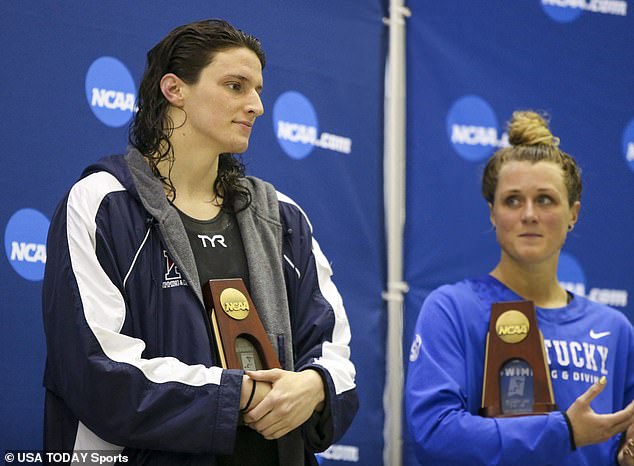
A University of Kentucky swimmer and one of 2022’s NCAA Woman of the Year nominees, joined tennis legend Martina Navratilova and others in speaking out after transgender swimmer Lia Thomas was put up for the prestigious award.
UPenn has named Thomas, 22, as one of two students nominated for the National College Athletics’ Association’s Woman of the Year Award.
‘[T]his is yet another slap in the face to women. First a female national title and now nominated for the pinnacle award in collegiate athletics. The NCAA has made this award worthless,’ Kentucky swimmer Riley Gaines tweeted in response.
Gaines and Thomas famously tied for fifth place in the women’s 200-meter NCAA championships in March, but as there was only one trophy, Gaines was told by the event’s organizers that the trophy would be given to Thomas, while hers would be mailed at a later time.
Gaines wasn’t the only female athlete to tweet her outrage.
Navratilova, who has won the most major titles in women’s tennis in the Open Era, also took to Twitter to deride the nomination.
‘Not enough fabulous biological women athletes, NCAA?!? What is wrong with you?!!!!!!!?’ she tweeted.




Riley Gaines (pictured right), University of Kentucky swimmer and one of 2022’s NCAA Woman of the Year nominees, is speaking out after the University of Pennsylvania nominated transgender swimmer Lia Thomas (pictured left) for the prestigious award
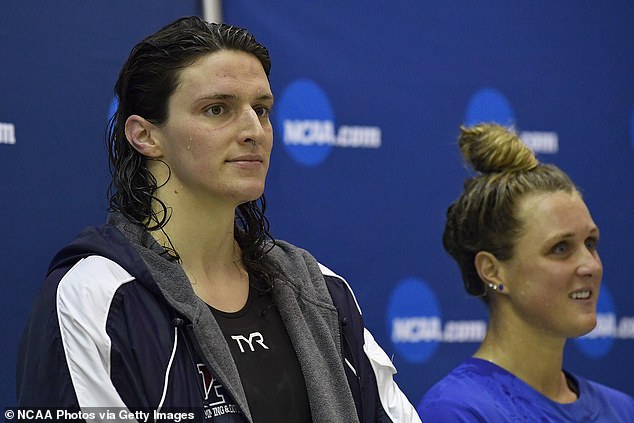





Gaines and Thomas famously tied for fifth place in the women’s 200-meter NCAA championships in March, but as there was only one trophy, Gaines was told by the event’s organizers that the trophy would be given to Thomas, while hers would be mailed at a later time
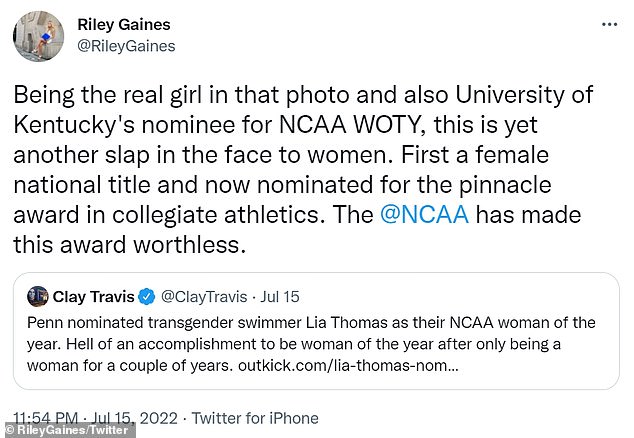





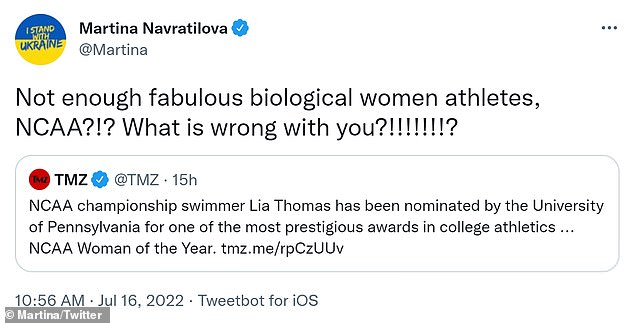











Tennis legend Martina Navratilova is also joining the criticism for Thomas’ nomination
Other athletes and commentators also chimed in.
Former NCAA champion swimmer Marshi Smith wrote: ‘How many women’s awards are we willing to surrender? The Ivy League choosing a male as their nominee is doubling down on their anti-woman campaign.’
Smith suggested Gaines, a swimmer at the University of Kentucky who competed against Thomas, should win the award.
Physics teacher Debbie Hayton, who is herself transgender, was similarly critical: ‘I urge Thomas to do what is right and respectfully decline the nomination, and possibly generate some respect.’
Commentators away from the world of sports also weighed in, with podcast host Allie Beth Stuckey writing: ‘NCAA dubs ‘Lia’ Thomas ‘woman’ of the year. You have the laugh at the audacity of our current dystopia. Rest assured that the harder they push this stuff, the harder the pendulum will swing back. And it will swing back—sooner than you think.’
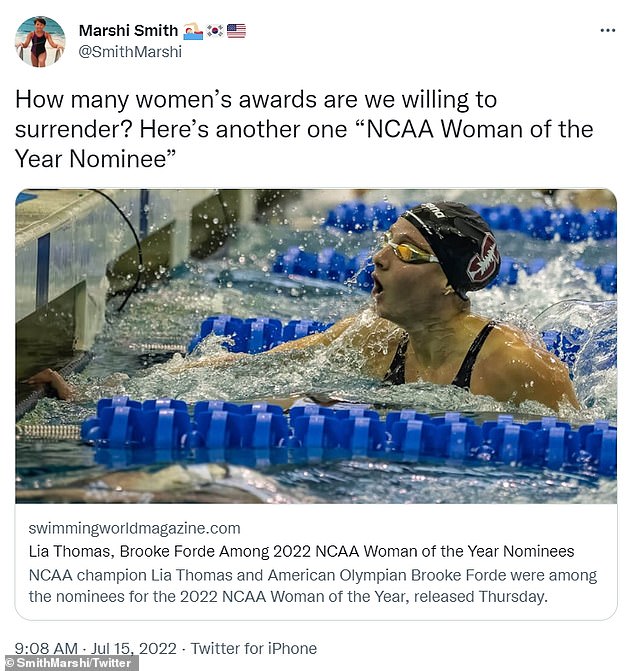





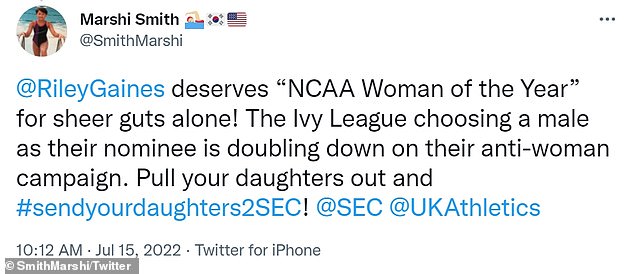





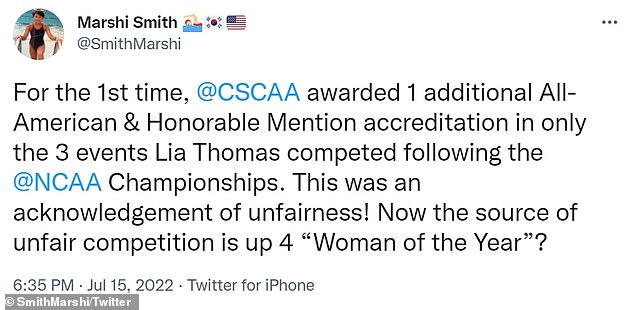





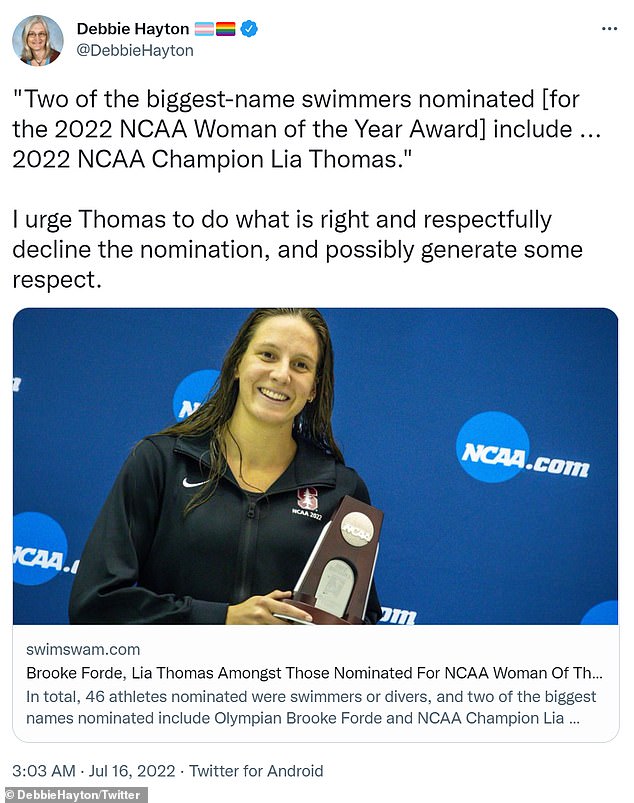











The University of Pennsylvania’s other nominee is Russian tennis player Luliia Bryzgalova.
Each school is allowed two nominations as long as one of the athletes is an international student or a person of color and both must be graduating. The winner will be announced at an NCAA event in San Antonio, Texas, in January 2023.
Thomas, 22, made headlines at the beginning of swim season after parents and college swimming enthusiasts blanched at a transgender woman competing in women’s sports.
They say she has considerable biological advantages over rival swimmers born female. Competitive swimming body FINA has issued staunch new guidelines that effectively ban trans female swimmers as a result of the controversy Thomas triggered.
But UPenn has plowed on with its nomination of Thomas regardless, despite frequent condemnation from fellow athletes and their families over her success.
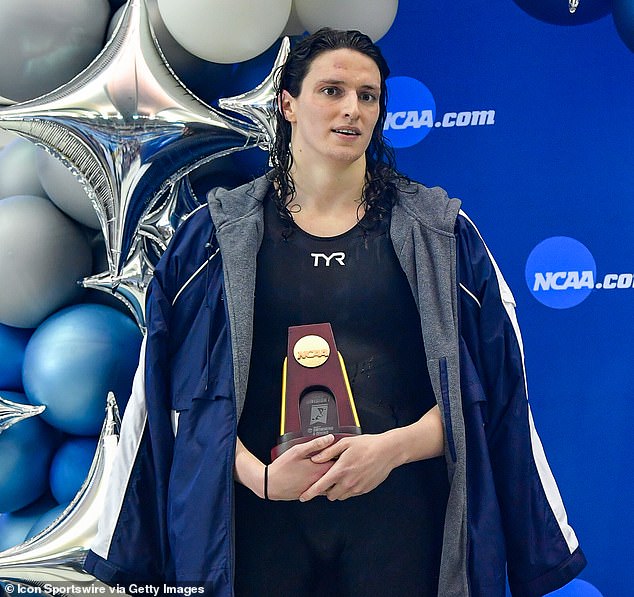





The University of Pennsylvania nominated Lia Thomas, 22, (pictured) for the NCAA Woman of the Year award
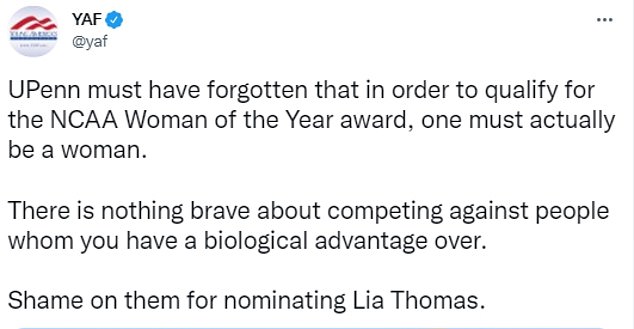





The school is being ‘shamed’ for nominating her. A conservative college organization Young America’s Foundation wrote on Twitter that there is ‘nothing brave about competing against people whom you have a biological advantage over’
‘Shame on them for nominating Lia Thomas,’ a conservative college organization Young America’s Foundation wrote on Twitter. ‘UPenn must have forgotten that in order to qualify for the NCAA Woman of the Year award, one must actually be a woman.
The award was established in 1991 and ‘recognizes female student-athletes who have exhausted their eligibility and distinguished themselves in their community.’
Although Thomas placed high on the leaderboard throughout the swim season, she only won the 500-yard freestyle at the championships.
Analysis subsequently uncovered suggested that Thomas was deliberately suppressing her performance to avoid a clean sweep of wins that would have further inflamed allegations of unfairness.
Throughout the season, many called for Thomas’ removal from the team, including from some of her teammates.
UPenn swimmers were reportedly told by the college that ‘Lia’s swimming is a non-negotiable.’
‘They’ve made it pretty clear, if you speak up about it, your life will be over in some way, you’ll be blasted all over the internet as a ‘transphobe,’ … you’ll never be able to get a job,’ one of the girls anonymously told documentary maker Matt Walsh in June.
One anonymous student also said that the college was so determined to protect Lia because she helps them score points over other schools. Lia’s performance helped the team move seven places up the leaderboard from 27th in 2019 to 20th in 2021.
‘Lia obviously helps us do better. She is swimming really fast. Her performance helps the UPenn swim team. The feeling of winning doesn’t feel as good anymore because it feels tainted,’ she said.
Earlier this year, Thomas also expressed a desire to be an Olympian.
In an interview with Good Morning America, she admitted she is ‘no medical expert’ but she said some cisgender females have more testosterone, bigger hands and feet and are taller than their competitors – so why should she banned when they aren’t.
‘I don’t need anybody’s permission to be myself,’ she said. ‘I intend to keep swimming … It’s been a goal of mine to swim at Olympic trials for a very long time, and I would love to see that through.’
She also said anyone who says she isn’t allowed to compete as a woman is transphobic, regardless of whether or not they support her right to transition.
‘You can’t go halfway and be like ‘I support trans people but only to a certain point. If you support transwomen and they’ve met all the N.C.A.A. requirements, I don’t know if you can say something like that.






UPenn also nominated Russian tennis player Luliia Bryzgalova (pictured)
‘Trans women are not a threat to women’s sport,’ she said.
However, las month, FINA – swimming’s governing body – banned transgender athletes from elite events.
Athletes would have to have transitioned before the age of 12 to compete.
FINA also proposed an ‘open’ section for transgender athletes to compete in.